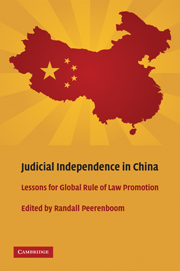Book contents
- Frontmatter
- Contents
- Contributors
- 1 Introduction
- 2 Halfway Home and a Long Way to Go
- 3 A New Approach for Promoting Judicial Independence
- 4 The Party and the Courts
- 5 Judicial Independence in China
- 6 A New Analytic Framework for Understanding and Promoting Judicial Independence in China
- 7 Judicial Independence and the Company Law in the Shanghai Courts
- 8 Local Courts in Western China
- 9 The Judiciary Pushes Back
- 10 Corruption in China's Courts
- 11 A Survey of Commercial Litigation in Shanghai Courts
- 12 Judicial Independence in Authoritarian Regimes
- 13 Judicial Independence in East Asia
- Index
- References
10 - Corruption in China's Courts
Published online by Cambridge University Press: 05 June 2012
- Frontmatter
- Contents
- Contributors
- 1 Introduction
- 2 Halfway Home and a Long Way to Go
- 3 A New Approach for Promoting Judicial Independence
- 4 The Party and the Courts
- 5 Judicial Independence in China
- 6 A New Analytic Framework for Understanding and Promoting Judicial Independence in China
- 7 Judicial Independence and the Company Law in the Shanghai Courts
- 8 Local Courts in Western China
- 9 The Judiciary Pushes Back
- 10 Corruption in China's Courts
- 11 A Survey of Commercial Litigation in Shanghai Courts
- 12 Judicial Independence in Authoritarian Regimes
- 13 Judicial Independence in East Asia
- Index
- References
Summary
INTRODUCTION
Corruption in China's courts is a neglected field of study in both Chinese and English language academic circles. Although scholars and commentators have pointed out various deficiencies in the operation of courts, their relation to corruption has never been closely examined, let alone systematically investigated. Policymakers as well as scholars seem rather more ready to attribute judicial problems to external factors, such as undue interference from the Chinese Communist Party (CCP), lack of resources, and local protectionism. Even when scholars pay attention, they do so most often only in passing. This casual treatment of corruption in the courts has resulted in the marginalization of the problem in academic discourse. As a result, corruption in the courts appears omnipresent yet untraceable and elusive.
The relative scarcity of studies on this topic is perhaps attributed to the sensitive nature of the topic, which makes empirical research difficult. The fact that corruption is openly denounced and severely punished in China makes interviews with judges or other court officials difficult. Even for punished and closed corruption cases against court officials, access to case files is highly restricted. For researchers, attending court trials sometimes may yield interesting findings. However, what is seen in courtrooms provides little information on what happened behind the scenes. This lack of data makes any systematic analysis of corruption in the courts immensely challenging.
- Type
- Chapter
- Information
- Judicial Independence in ChinaLessons for Global Rule of Law Promotion, pp. 196 - 220Publisher: Cambridge University PressPrint publication year: 2009
References
- 3
- Cited by

